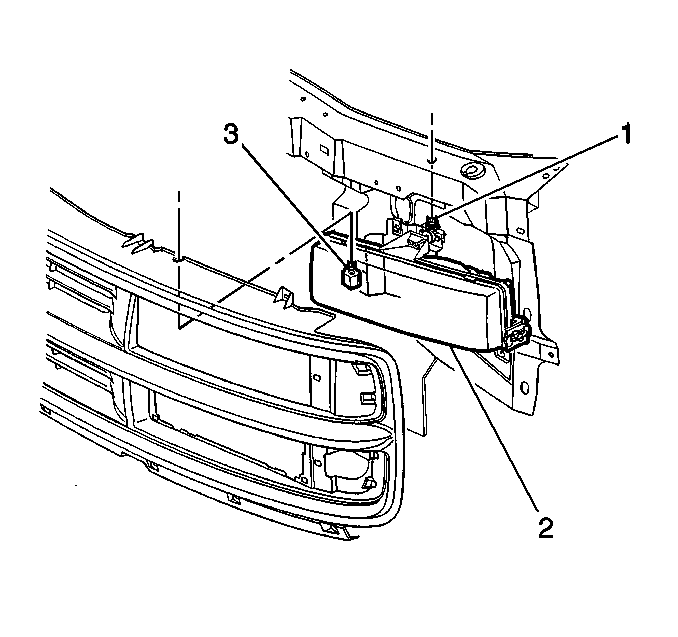Visual Aiming Procedure
| • | All equipment for testing headlamps must comply with the SAE Recommended
Practice for Headlamp Inspection Equipment. |
| • | If you use a headlamp testing machine, the machine should give
results equivalent to the results obtained using the screen procedure. |
| • | The machine should be in good condition and be properly adjusted. |
| | Use the machine in accordance with the manufacturer's instructions. |
| • | Machines that use a photoelectric cell or cells to determine aim,
should also include a visual screen on which you can project a beam pattern
proportional to the beam appearance, and aim on a screen at 7.62 m
(25 ft). |
| • | The screen should be plainly visible to the technician who is
adjusting the headlamps. |
| • | The screen should have horizontal and vertical reference lines
in order to permit visual evaluation of the headlamp beam. |
Headlamp Aiming Location (Using Screen Method)
| • | The aiming area should be darkened and large enough to allow for
the vehicle and an additional 7.62 m (25 ft), measured from
the face of the headlamps to the front of the screen. |
| • | The floor on which the vehicle rests must be parallel with the
bottom of the screen. |
| | If the floor is not level, compensate accordingly. |
Headlamp Aiming Screen
| • | If you use a screen, the screen should be at least 1.52 m
(5 ft) high x 3.66 m (12 ft) wide with a matte white
finish, well shaded from extraneous light. |
| • | Properly adjust the screen to the floor on which the vehicle rests. |
| • | The screen should be moveable so that you can align the screen
parallel to the rear axle of the vehicle. |
| • | Position the screen so that a horizontal line drawn perpendicular
to the centerline of the screen will pass an equal distance midway between
the two headlamps. |
| • | The screen should have the following items: |
| • | Two laterally adjustable vertical tapes |
| • | One vertically adjustable horizontal tape |
| • | If a regular commercial aiming screen is not available, the screen
may consist of a wall having a clear, uninterrupted area at least 1.83 m
(6 ft) x 3.66 m (12 ft) wide. The surface should be
finished with a no-gloss white paint. |
| • | After the aiming screen has been set up and located, paint or
tape a reference line on the floor 7.62 m (25 ft) from the screen.
Park the vehicle with the front of the headlamps directly over this reference
line. |
Headlamp Aiming Procedure
- Park the vehicle square with the screen, with the headlamps directly
over this reference line.
- Ensure that the components are in place if other work has been
done on the vehicle.
- Ensure that the vehicle is on a level surface.
- Stop all other work on the vehicle.
- Ensure that the vehicle has half a tank, or less, of fuel.
- Close all of the doors.
- Rock the vehicle sideways.
- Line up the centerline of the vehicle with the centerline of the
aiming screen.
| • | Mark the vertical center of the rear and front windows using tape. |
| • | Use these lines as sights in order to line up the centerline of
the vehicle and the screen. |
- Adjust the vertical tapes on the screen in order to match the
vertical centerline of each low beam headlamp.
Measure the distance from the centerline of the low beam lamp.
- Adjust the horizontal tapes on the screen in order to match the
horizontal centerline of each low beam headlamp.
Measure the height from the floor to the center of the low beam.
- Turn on the low beam headlamps.
- Observe the left and the top edges of the high intensity zone
on the screen.
- Adjust the headlamps to the following specifications:
| • | The top edge of the center of intensity on the screen for the
low beam should be less than 101.6 mm (4 in) above or below
the cross section of the headlamp centerlines. |
| • | The left edge of the center of intensity on the screen for the
low beam should be less than 101.6 mm (4 in) to the left or
right of the cross section of the headlamp centerlines. |
Alternate Headlamp Aiming Procedure
Tools Required
J 25300-D Headlamp
Aimer

- Ensure that the components
are in place if other work has been done on the vehicle.
- Ensure that the vehicle is on a level surface.
- Stop all other work on the vehicle.
- Ensure that the vehicle has half a tank, or less, of fuel.
- Close all of the doors.
- Rock the vehicle sideways.
- Using the J 25300-D
, adjust the headlamps to the specifications required by state and
local authorities.
| • | Instructions for tool use accompany the tool. |
| • | This kit contains special adapters for use with composite headlamps
(2). |

